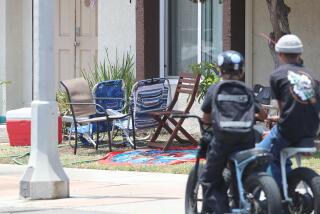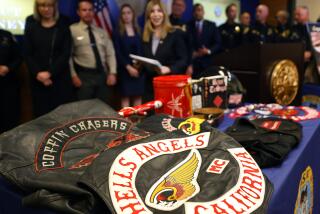Huntington Skinhead Given Life Sentence
A card-carrying member of the Ku Klux Klan was sentenced Friday to 30 years to life in prison for repeatedly stabbing a Native American in Huntington Beach, a crime that shocked the city into action against its skinheads and white supremacists.
Erik R. Anderson, 22, of Huntington Beach was convicted of attempted murder with premeditation for stabbing 20-year-old George Mondragon 27 times on a night in 1996.
Before Anderson was sentenced, Mondragon’s mother, Toni Velasquez, read a five-page statement, telling Anderson, “I believe that night you wanted my son dead. I thank God you didn’t succeed.”
As she drove to the hospital the night of Feb. 3, 1996, Velasquez said, “I kept saying . . . ‘George, please don’t die. Mom’s coming.’ ” When she finally saw her son, he “was all swollen with tubes sticking out everywhere. I said, ‘Mom’s here,’ and a big tear came out and ran down his cheek.”
Anderson and Steven Eckert, 18, of La Palma had confronted Mondragon and two friends at a lifeguard tower. Anderson and Eckert were regulars in a crowd of skinheads that frequented Main Street, throwing Nazi salutes, harassing ethnic minorities and frightening pedestrians. That night, they had harassed several passersby.
Mondragon tried to leave when the two confronted him, but in a frenzy, Anderson began stabbing him. The assault was so unbridled that Anderson inadvertently stabbed Eckert, wounding him in the eye.
Eckert, tried separately, was sentenced earlier to 12 years in prison. Another man, Shannon Martin, 23, of Huntington Beach, pleaded guilty to hiding the large hunting knife used in the attack, and was sentenced to 16 months in prison.
Although Anderson’s white supremacist beliefs and the stabbing were never disputed, Deputy Public Defender Anthony Pond argued that his client was so deranged by beer and marijuana he was not capable of premeditation.
Pond said the conviction and sentencing will be appealed.
“The whole focus of our case was his mental state: Did he engage in meaningful reflection?” Pond said. “Another reasonable interpretation of the evidence would support a lack of premeditation, and if you have two interpretations, the law directs you to adopt the one that points to innocence.
Even though Anderson “was out looking to stab somebody, that’s not necessarily the same as premeditating and deliberating on an intent to kill,” Pond said.
Although Anderson was surprised that he was convicted of premeditation, Pond said, by Friday he was resigned to the probability of a life sentence.
Mondragon was not in the courtroom. He works in a pizza parlor and a bagel shop, and also is in a punk rock band, his mother said.
He has nightmares and gets “paranoid” when he sees skinheads, she said.
Evidence showed that police had known Anderson as a skinhead for several years before the attack, Deputy Dist. Atty. Brian Kazarian said. Officers who stopped him on an earlier occasion had found a Knights of the Ku Klux Klan photo identification card, he said. And his stomach bears a tattoo of a KKK member on a horse holding a burning cross.
“It was my understanding and my opinion he was progressively getting harder, and his crimes more serious,” Kazarian said.
The attack on Mondragon followed the fatal shooting in 1994 of an African American man outside a McDonald’s restaurant on Beach Boulevard by two skinheads and was a final blow to the city’s image.
Huntington Beach had become a magnet for white supremacist youths, whose actions had stamped the city as a haven for racists.
Since then, an aggressive human relations initiative by the city and increased police presence on Main Street have diminished the skinhead presence.
“Those two incidents gave us thought,” said former Huntington Beach Mayor Ralph Bauer. “This is a mostly Anglo community . . . but the community was so outraged that it said maybe we ought see to it to educate the community to see that this sort of thing cannot happen here.”
With the help of the Orange County Human Relations Commission, the city started its own task force.
“We’re trying to sensitize people to be decent to each other,” Bauer said.
But the city does not stop at merely promoting goodwill. It also has made it clear to white supremacists that any illegalities will be prosecuted.
Times wire services contributed to this report.
More to Read
Sign up for Essential California
The most important California stories and recommendations in your inbox every morning.
You may occasionally receive promotional content from the Los Angeles Times.










